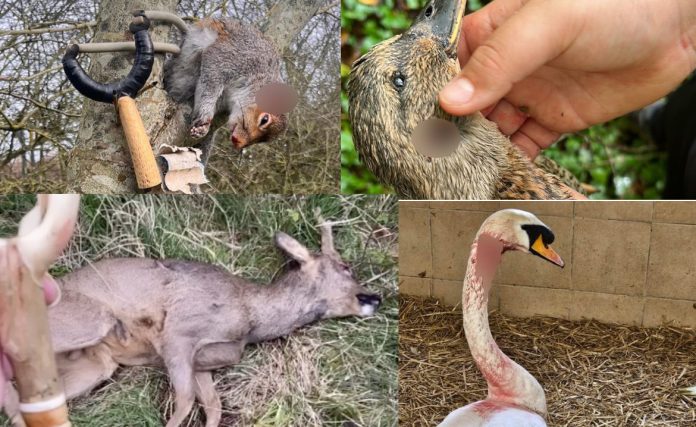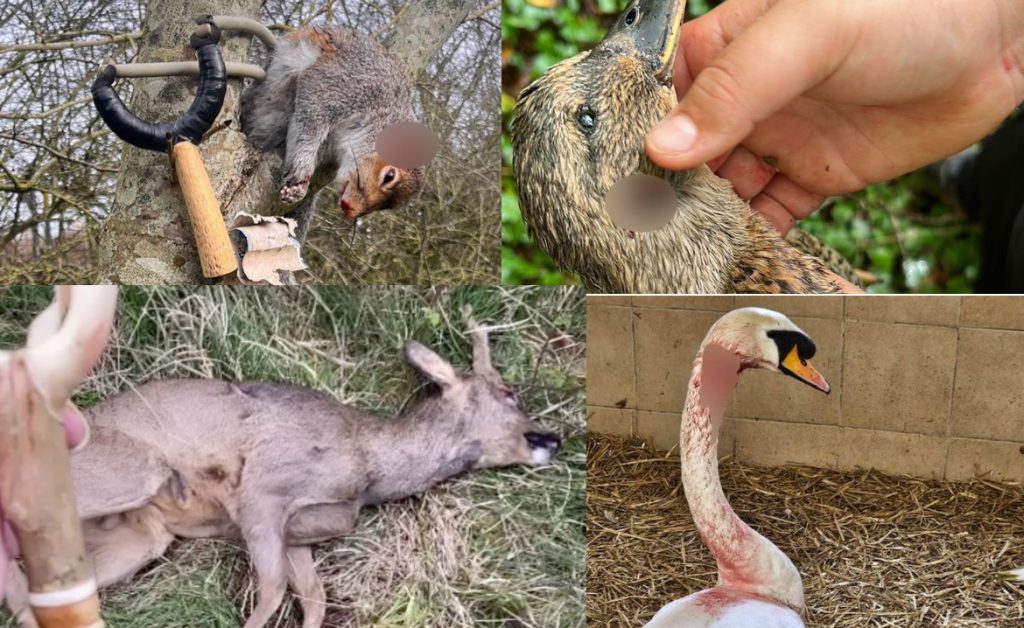
A shocking revelation has brought to light a disturbing trend involving children across the UK engaging in heinous acts of violence against animals, all documented and shared within a clandestine network on WhatsApp. This appalling activity, which includes the use of catapults to inflict harm and death upon innocent creatures, has sparked widespread concern and calls for urgent action.
The distressing evidence reveals that children, some as young as primary school age, are not only participating in these acts of cruelty but also eagerly sharing videos and images of their exploits within WhatsApp groups. In these graphic recordings, injured animals are seen suffering agonising deaths, often lingering in pain after being struck by projectiles launched from handheld catapults. Even more disturbingly, some of the children involved go beyond mere killing, engaging in further acts of torture and abuse against the defenseless animals, all for the sake of amusement and a twisted sense of entertainment.
The sheer scale of this phenomenon is staggering, with nearly 500 members identified across 11 WhatsApp groups dedicated to sharing content related to catapult violence against animals. Within these groups, over 350 photos and videos depicting the brutalisation of various species have been circulated, demonstrating the alarming extent of this disturbing trend.

Among the victims are a range of animals, including pigs, deer, pigeons, foxes, squirrels, pheasants, rabbits, geese, and ducks. The cruelty inflicted upon them knows no bounds, with one charitable organisation, The Swan Sanctuary, reporting a significant increase in birds suffering from catapult injuries. Volunteers at the sanctuary have been confronted with the devastating aftermath of these attacks, witnessing birds with catastrophic wounds to their heads and necks, caused by what they describe as “pure kill shots” from the catapults. X-ray images reveal the grim reality, with ball bearings embedded in the bodies of the birds and bones shattered by the force of the projectiles.
The emotional toll on those who rescue and care for these animals is profound, as they witness firsthand the senseless suffering inflicted upon innocent creatures. Danni Rogers, a volunteer at The Swan Sanctuary, describes the harrowing injuries she has encountered, including fractures, exploded eyes, and ruptured windpipes, all inflicted by the merciless actions of individuals driven by nothing but cruelty and malice.
The impact of these atrocities extends beyond the immediate victims, with reports of children brazenly flaunting their kills as trophies, leaving behind a trail of death and destruction in their wake. Incidents such as discovering a freshly killed pigeon left as a macabre prize next to a rescue vehicle serve as chilling reminders of the callousness exhibited by those involved in these barbaric acts.
The evidence paints a disturbing picture of a generation desensitised to the suffering of animals, with children as young as primary school age actively participating in acts of violence and cruelty. Voice notes shared within these WhatsApp groups offer further insight into the mindset of the perpetrators, with chilling descriptions of their kills delivered with callous indifference and even a sense of pride.
Geoff Edmond, lead wildlife officer at the RSPCA, describes the catapult killings as an “emerging trend,” emphasising the deliberate and intentional targeting of animals for sport by those involved. The organisation has seen a concerning rise in reports of injured animals subjected to catapult attacks, indicating the urgent need for intervention to prevent further harm.
Despite the disturbing nature of these acts, current legislation falls short of effectively addressing the issue. While it is not illegal to possess or carry a catapult, the actions carried out with these weapons clearly violate existing laws protecting animal welfare. The Animal Welfare Act 2006 prohibits causing unnecessary suffering to animals, while the Wildlife and Countryside Act 1981 offers limited protection to certain species. However, the absence of specific regulations addressing the use of catapults leaves a significant gap in legal enforcement.
Henry Smith, vice-chair of the All Party Parliamentary Group for Animal Welfare, has called for urgent action to address this legislative gap, advocating for criminal sanctions against those who use catapults to inflict harm on animals. He also highlights the need to restrict access to these weapons, particularly among minors, to prevent further incidents of cruelty.
The availability of catapults for purchase online, coupled with the ease with which they can be acquired and shared, exacerbates the problem further. Online platforms like eBay and Amazon facilitate the sale and distribution of these weapons, providing a convenient marketplace for those seeking to engage in acts of cruelty against animals.
In response to these revelations, WhatsApp has stated that the sharing of such material violates its terms of use and that it cooperates with law enforcement agencies to address these issues. However, the continued prevalence of these WhatsApp groups highlights the challenges of effectively policing and enforcing regulations within online spaces.
As concerns mount over the escalating violence perpetrated against animals, organisations like the RSPCA continue to advocate for greater awareness and intervention to protect vulnerable wildlife. Efforts to address this issue must extend beyond legislative measures to encompass education, enforcement, and support for those affected by these senseless acts of cruelty.
For those who wish to support injured or targeted wildlife, resources and information are available through organisations like the RSPCA, providing guidance on how individuals can make a difference in protecting and caring for animals in need.
The traits of a psychopath
A psychopath typically exhibits a range of behaviours characterised by a lack of empathy, manipulativeness, deceitfulness, and a disregard for societal norms and the rights of others. They may be charming and charismatic on the surface, but they lack genuine emotions and remorse. Psychopaths often engage in impulsive and irresponsible actions without considering the consequences for themselves or others. They may display a superficial charm to manipulate those around them for personal gain and have a propensity for antisocial behaviour, including aggression and criminality. Overall, the behavior of a psychopath is marked by a profound inability to form meaningful emotional connections and a tendency towards self-serving actions at the expense of others.
If you like our content, join us in helping to bring reality and decency back by SUBSCRIBING to our Youtube channel: https://www.youtube.com/channel/UCQ1Ll1ylCg8U19AhNl-NoTg AND SUPPORTING US where you can: Award Winning Independent Citizen Media Needs Your Help. PLEASE SUPPORT US FOR JUST £2 A MONTH https://dorseteye.com/donate/











